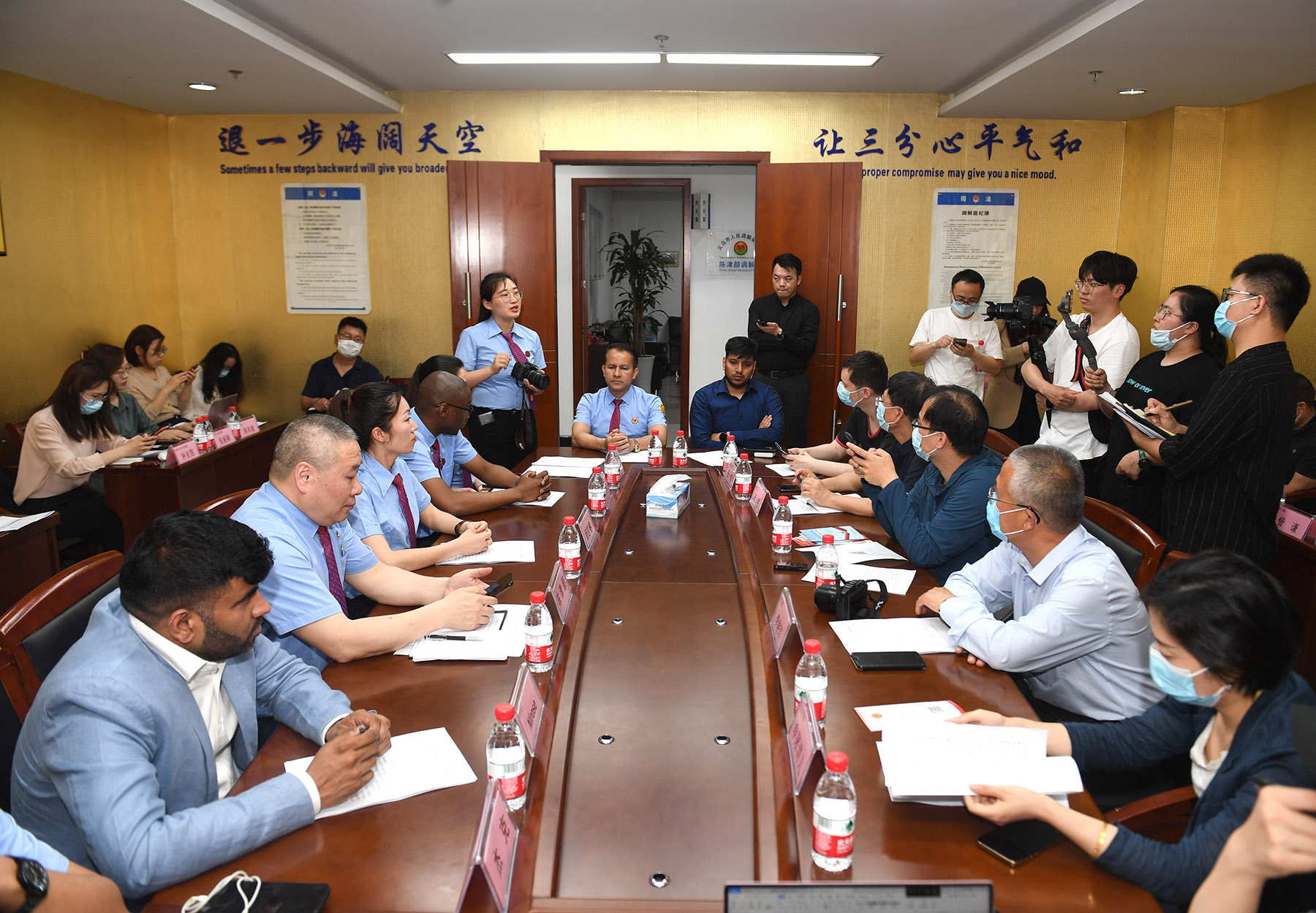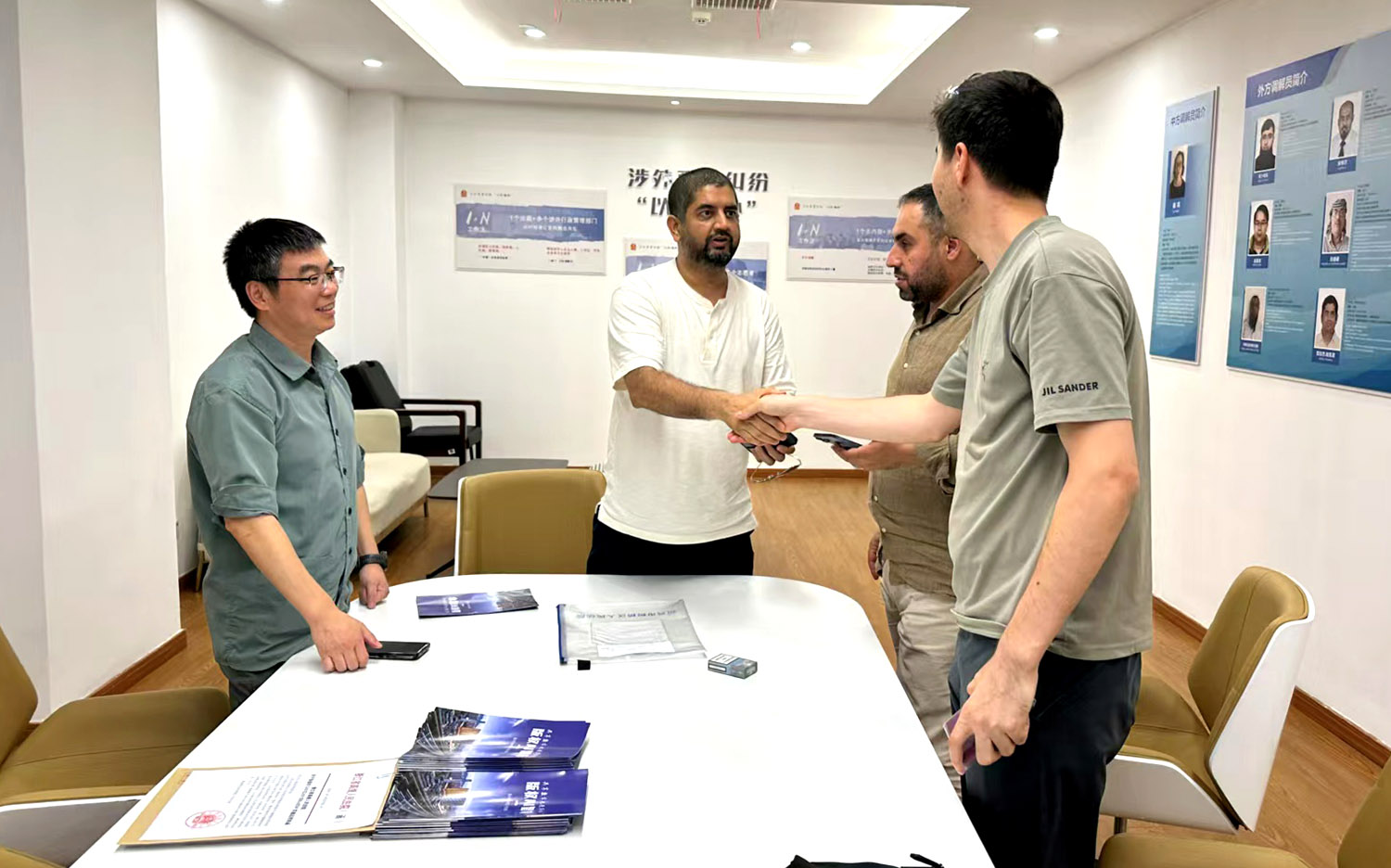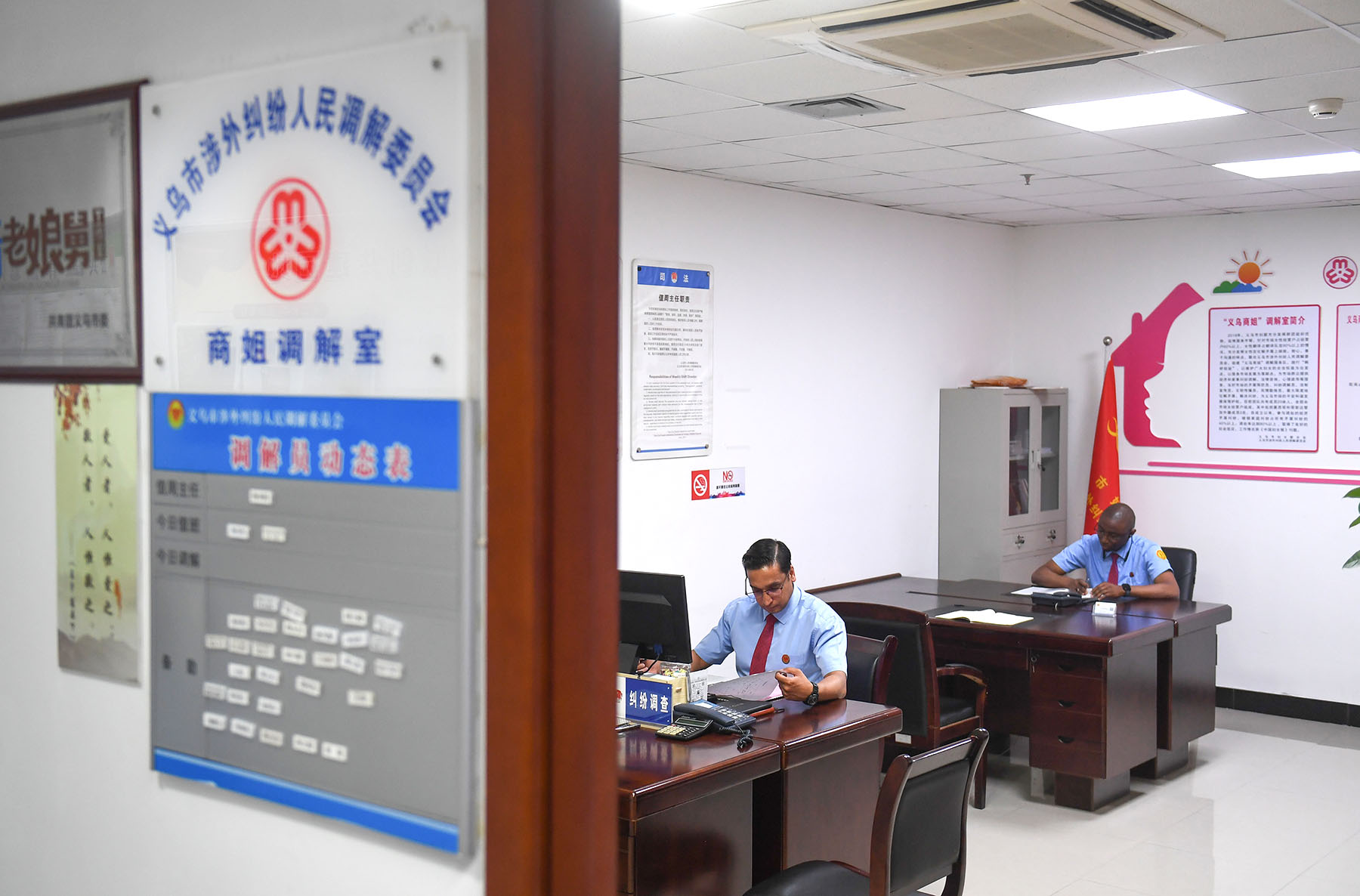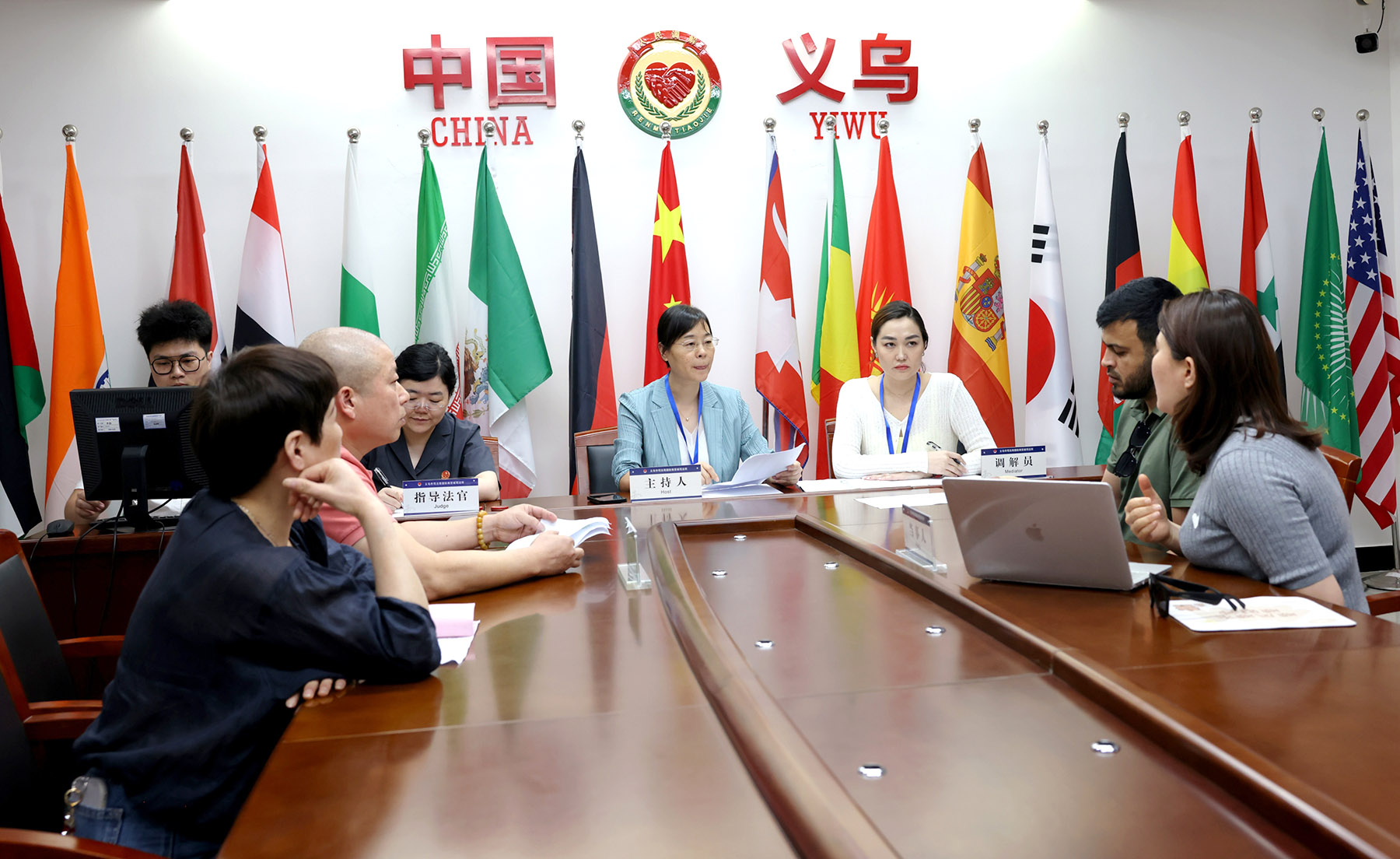Assistants with language skills, cultural understanding aid courts in handling cases

Kyrgyzstan native Meerzat Omuralieva has made a name for herself in Yiwu, Zhejiang province.
As a popular businesswoman in the jewelry trade in this global hub for small commodities, she is also a trusted mediator for numerous international merchants.
On June 12, Omuralieva arrived at the People's Mediation Committee for Foreign-related Disputes of Yiwu City, located in the Yiwu International Trade Market. Her job that day was to assist an Azerbaijani businessman in a dispute over a 110,000 yuan ($15,315) purchase of beach pants from a Chinese vendor surnamed Huang.
The Azerbaijani, encountering problems with the color and tags of the pants, sought help from the committee. However, due to his limited proficiency in both Chinese and English, Omuralieva, who is well-versed in the languages and cultures of both parties, was brought in to mediate, with the support of a judge.
READ MORE: HK mediation organization a new dispute settlement option
"Language barriers can indeed cause misunderstandings between Chinese and foreign merchants. Even when people speak the same language, cultural differences can also lead to disputes," Omuralieva said, adding that being "multilingual and culturally aware" is essential for mediation.
With over 21,000 foreign merchants from more than 100 countries, the city saw its import and export value reach 668.9 billion yuan in 2024, an increase of 18.2 percent from the previous year, according to Yiwu customs data. Such high economic activity means disputes over payments and product standards are common.
To address these issues, Yiwu established China's first such committee to mediate disputes between Chinese and foreign businesses in May 2013. Under the guidance and judicial confirmation of the Yiwu court over the past decade, the committee has attracted 20 foreign mediators from 15 nations, such as South Korea, Nepal, India, Germany, Afghanistan, and Kyrgyzstan, and mediated 1,259 disputes to date.
Ye Fei, chief judge of the court's Fourth Civil Division, lauded this approach of leveraging foreigners to help mediate foreign-related disputes, and regards it as an innovation to provide more efficient legal services for enterprises from abroad. Over the past three years, 83 percent of international commercial disputes mediated through this innovative mechanism have been successfully resolved, she said.

Building confidence
In 2016, Omuralieva came to Yiwu to study Chinese at a local industrial and commercial vocational and technical college. About one year later, by chance, she learned that the mediation committee was recruiting volunteer translators. Encouraged by her teacher, she signed up.
"At that time, I didn't know that in China, disputes could be resolved through mediation instead of litigation. This is something we don't have in my country," she said. After observing and participating in mediation several times, she was truly impressed by the Chinese dispute resolution mechanism, which she described as "equal, efficient, and trustworthy".
Over the past five years, Omuralieva has resolved many disputes through mediation. "I can give foreign merchants a greater sense of security," she said, adding that using her language and cultural advantages to help them address issues in a time-saving and cost-effective manner is something she finds very meaningful.
Raj Kumar Khadka, a Nepalese business owner, is also a volunteer foreign mediator. Since 2018, he has mediated more than 100 disputes with a success rate of over 95 percent. Recalling a case that took four and a half hours to mediate in late March, Khadka said, "I was so excited and cheered up when I saw the Cameroonian trader and the Chinese merchant shake hands and make an agreement in the end."
More than 20 years ago, while doing business in India and Thailand, Khadka noticed that many goods in those countries came from Yiwu. This piqued his interest in the eastern Chinese city. In 2002, he first set foot in Yiwu and was instantly captivated by its vibrant business atmosphere, which inspired him to start his own business.
After a decade of hard work, he opened his own trading company, engaging in toy and hardware exports. In 2015, he saw the mediation committee signboard in the market. Out of curiosity, he began learning about how it deals with foreign-related disputes through mediation.
"My Chinese was not good at that time, so I could only be an observer," he laughed. After two years of preparation and eight months of training organized by the committee in 2017, he became a foreign mediator in 2018.
"Yiwu has not only made my business successful but also enriched my life. It's my second hometown," he said. "Since I have received so much from this city, I also want to give something back."
Khadka is required to spend two to three days a month on duty at the committee. When emotionally agitated foreign merchants come for help or apply for mediation, he always greets them with a smile and offers them understanding.
"It is inevitable that Chinese and foreign merchants will have disputes over product delivery standards or payment. A way to ease their anger is to patiently listen to both sides and promptly figure out what their problems are," he said.
Khadka said providing mediation services to foreign traders has allowed him to earn their trust and build new friendships.

Judicial assistant
In 2015, the Yiwu court joined the process by launching a litigation-mediation linkage mechanism.
With the consent of both parties, the court can refer foreign-related civil or commercial disputes to the committee for mediation. If mediation is unsuccessful, the dispute can proceed to litigation.
During the process, the Yiwu justice bureau is responsible for reviewing the qualifications of foreign mediators. The court's role is to enhance the legal guidance and support for the mediation of disputes.
Chen Chengjian, vice-president of the court, praised the involvement of foreign mediators, saying that they have alleviated the difficulties judges face in contacting foreign defendants and delivering legal documents.
"They can also quickly close the distance with foreign business persons, who will naturally trust them," he explained in regard to foreign mediators' role as "judicial assistants".
In Keqiao, Shaoxing, just a two-hour drive from Yiwu, foreign mediators have been playing a significant role in supporting judges. Keqiao handles about a quarter of global textile transactions each year, with products sold to over 190 countries and regions. It is also home to more than 5,000 foreign merchants, and disputes involving foreigners are not uncommon.
"Many foreign litigants only had names, lacking detailed contact information and home addresses, which brought a great challenge for us to find them and deliver case materials in time," Li Zisu, vice-president of the Keqiao District People's Court, said.
"Additionally, language and cultural differences also increased the difficulty of tackling disputes. This is why since 2018 we've formed a team consisting of foreigners who have spent many years studying and conducting business in China and are fluent in Chinese to assist judges in mediating international cases."
Antar Ali, from Yemen, is a member of the team. After graduating from the East China University of Science and Technology in Shanghai in 2000, Ali briefly returned to his home country before going to Keqiao to run a textile business.
In September 2018, he applied to join the team. Soon, he started mediating for merchants mainly from Yemen, Pakistan and India. "Helping resolve disputes between Chinese and foreigners has improved my business credibility, and brought me a great sense of fulfillment," he said.
While incorporating the knowledge of Chinese law provided by judges into his mediation efforts, Ali also shares legal information and his own mediation experiences with new foreign traders who come to Keqiao.

Trade contributor
With numerous tech innovation enterprises and significant market potential, Zhejiang is adopting an open stance toward foreign investors and business people to promote its high-level opening-up and high-quality economic development.
Adhering to the principle of equal protection for both domestic and foreign parties, courts across the province are striving to establish themselves as the preferred venues for resolving international commercial and maritime disputes. These efforts are also helping showcase China as a nation governed by the rule of law in the handling of every case, according to the Zhejiang High People's Court.
In 2024, the provincial courts concluded 4,463 foreign-related commercial and maritime cases involving 117 countries and regions. Over 70 foreign parties voluntarily chose Zhejiang courts to resolve their disputes. "The trust from those foreign litigants was a vote of confidence in our business environment," the high court added.
ALSO READ: Digital advances herald judicial progress
Chen said foreign mediators contribute to the optimizing of the province's judicial services and the strengthening of its high-level openness to the world.
"Yiwu has become increasingly attractive to foreign merchants. Despite the pandemic, the number of foreigners coming here to do business has not decreased, but rather increased," he added.
Khadka said that many of his friends, whether back home or engaged in trade in other countries, are also keen to seek business opportunities in Yiwu, drawn by its open market and efficient legal services.
Contact the writer at caoyin@chinadaily.com.cn


